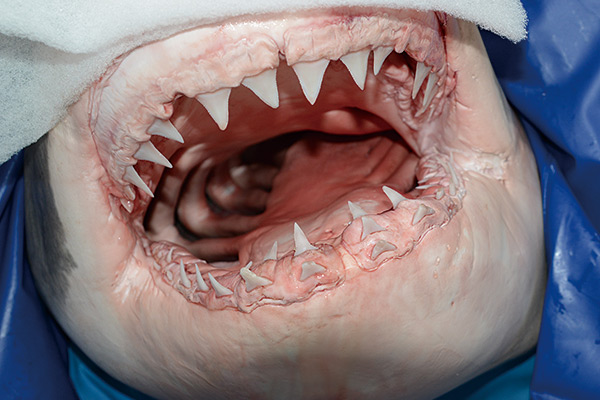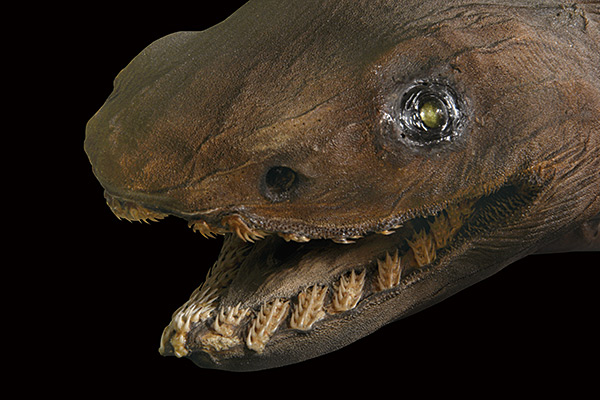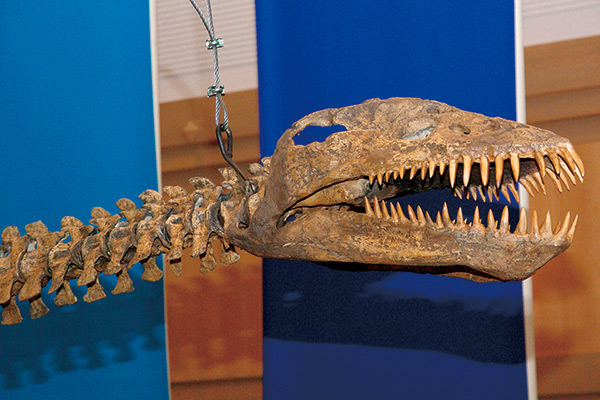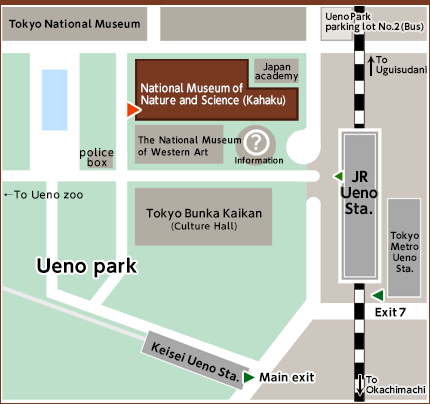Special Exhibition: Hunters of the Ocean
Go to Website Top
Our living sphere is surrounded by the ocean, and ocean‐dwelling creatures are living tough lives, trying to stay predators and not become prey. For the predators (i.e., hunters), it is vital that they acquire skills to hunt efficiently in order to survive in the ecosystem. For them, these are the very skills to “attain the energy source to stay alive.” All hunters of the ocean ― from huge sharks and whales, to tiny frogfish that are only a few centimeters in size ― are brilliantly skillful hunters. We believe that the visitors to the exhibition will be fascinated by the way they look and how they behave.
This exhibition focuses on oceanic hunters’ “predation,” the activities for survival, and presents the diversity of the hunters’ shapes, sizes, hunting techniques, and other features, with a particular attention to the evolution of their jaws and teeth.

The main attraction of this exhibition is an immersed specimen of the entire body of a 3.2 meter‐long, adult male great white shark (Carcharodon carcharias). This is the first time such a specimen has been exhibited in Japan. The immersed specimen of the great white shark was made after the shark was found dead, hooked on a fishing trawl line off Motobu‐cho in Okinawa Prefecture at the end of August 2014. A local fisherman took the shark to the Okinawa Churashima Foundation as a specimen for research, and with the special cooperation of the Foundation, the National Museum of Nature and Science was able to create the immersed specimen for research purposes. It is the first known immersed specimen of the entire body of an adult great white shark for research purposes in the world.
The specimen with well‐preserved organs, muscles, and other body parts is expected to contribute greatly to the advancement of various studies, including morphological comparison of the shark family, research of their habits, and other characteristics, as it offers a valuable opportunity for researchers to observe the real shark in close proximity. For conservation of biodiversity, the Museum considers it one of its missions to conduct research on fish species of the seas near Japan and pass the results, along with specimens to substantiate the findings, to future generations as the common heritage of humankind. Therefore, creation of the specimen of a rare large shark should give a significant impetus to relevant research.

In addition, the exhibition presents a variety of other immersed specimens, skeletal specimens, taxidermies, fossils, and reproductions of oceanic hunters in different parts of the world and those that thrived in ancient times. There are also exciting “action‐packed” videos capturing their hunting scenes, as well as displays with objectives of addressing the issues concerning the future of fishery resources and of exploring how humans and the ocean can co‐exist, such as the displays of bluefin tuna and Japanese eels.
We sincerely hope that this exhibition will serve as an opportunity for many people to experience the greatness of the ocean that supports the lives of diverse ocean‐dwellers and deepen their understanding on how marine creatures survive and sustain their lives.
Exhibition
| Title | Hunters of the Ocean |
|---|---|
| Period | July 8 – October 2, 2016 |
| Hours | 9:00 a.m. - 5:00 p.m. 9:00 a.m. - 8:00 p.m. (Every Friday) *Special opening hours: We will open on September 3, 10, 17, 24, October 1 from 9 a.m. to 8 p.m. *Last entry 30 minutes before closing. *Opening days, hours etc. are subject to alteration. Please check the website before your visit. |
| Closed | July 11th(Mon.), July 19th(The.), September 5th(Mon.), September 12th(Mon.), September 20th(Tue.) |
| Organizers | National Museum of Nature and Science, Nikkei Inc., BS Japan Corporation |
Ticket and Prices
| Adults and university students | |
|---|---|
| 1,600 yen (1,400yen*) | |
| Students of elementary /junior high / high school | |
| 600 yen (500yen*) | |
| * Prices in brackets for tickets bought by group of 20 or more visitors Tickets include admission to the permanent exhibitions. | |
Special Pair Ticket for Two on Friday Evenings
| Ticket and Prices |
|---|
| 2,000 yen |
| attention |
| * Pair tickets are only sold on the day * Holders must enter together / Pairs may be the same or different sex * Valid from 5 p.m. to 8 p.m. (Last admission 7:30 p.m.) |
Access
| map |
|---|

|
| view on app |
| adress |
| National Museum of Nature and Science, Tokyo 7-20 Ueno Park, Taito-ku, Tokyo 110-8718 (more infomation) |
